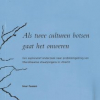Evaluation of the Croatian Drug Strategy 2006-2012
Summary
At the invitation of the Croatian Office for Combating Drugs Abuse of the Government of the Republic of Croatia (henceforth referred to as 'OCDA'), the Trimbos Institute has conducted an evaluation of the Drug Strategy of the Republic of Croatia (2006-2012) (hereinafter referred to as Drug Strategy).
We chose for an approach combining the assessment of stakeholders involved in drug policy implementation, of the achievements and future priorities with a review of the available data on the drug situation to get a picture how the drug problem and drug policy have developed in the period covered by the Drug Strategy. In chapter 1 we present a short introduction of the background and contents of the Croatian Drug Strategy (2006-2012), followed by a description of the scope of the evaluation and the chosen methodology and the rationale for the choices we made in chapter 2.
In chapter 3 we present the major findings from the consultation of the stakeholders and the review of the data. In chapter 4 we discuss findings which we see as relevant for writing the new Drug Strategy and present our conclusions regarding the key questions for this evaluation. In chapter 5 we present our recommendations for future drug policy making in Croatia.
| Categorie: | Transculturele drugsproblematiek |
| Bestandsgrootte: | |
| Bestandstype: | |
| Aanmaakdatum: | 05-20-2021 |
| Datum laatste update: | 05-20-2021 |



